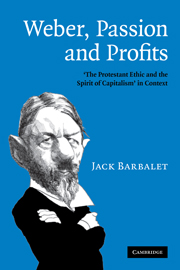Book contents
- Frontmatter
- Contents
- List of figures
- Acknowledgements
- Note on citations
- Introduction
- 1 From the inaugural lecture to the Protestant Ethic: political education and German futures
- 2 From the Protestant Ethic to the vocation lectures: Beruf, rationality and emotion
- 3 Passions and profits: the emotional origins of capitalism in seventeenth-century England
- 4 Protestant virtues and deferred gratification: Max Weber and Adam Smith on the spirit of capitalism
- 5 Ideal-type, institutional and evolutionary analyses of the origins of capitalism: Max Weber and Thorstein Veblen
- 6 The Jewish question: religious doctrine and sociological method
- Conclusion
- References
- Index
3 - Passions and profits: the emotional origins of capitalism in seventeenth-century England
Published online by Cambridge University Press: 22 September 2009
- Frontmatter
- Contents
- List of figures
- Acknowledgements
- Note on citations
- Introduction
- 1 From the inaugural lecture to the Protestant Ethic: political education and German futures
- 2 From the Protestant Ethic to the vocation lectures: Beruf, rationality and emotion
- 3 Passions and profits: the emotional origins of capitalism in seventeenth-century England
- 4 Protestant virtues and deferred gratification: Max Weber and Adam Smith on the spirit of capitalism
- 5 Ideal-type, institutional and evolutionary analyses of the origins of capitalism: Max Weber and Thorstein Veblen
- 6 The Jewish question: religious doctrine and sociological method
- Conclusion
- References
- Index
Summary
Weber's approach to the constitution of capitalist motivation is part of a larger framework, the merits of which cannot be overlooked. In order to understand any social process it is necessary to consider not simply how persons are subjected to external forces, but also how they accommodate themselves to those forces, and in doing so give them further direction. As an emergent historical formation capitalism grew out of a number of large-scale changes that began in the late Middle Ages and included innovation in techniques of agricultural production and patterns of trade. The economic opportunities that arose from these changes, including expanding market demand, price competition and profit taking, are background to the reorientations that persons experienced in their own evaluations, attachments, commitments and practices, which were undertaken in order to realize the potential of the new opportunities available to them and, in taking those opportunities, enhance further the nascent trends they represented and promoted. These reorientations of persons Weber summarized in the Protestant Ethic as the ‘spirit’ of capitalism. The source of these reorientations, Weber insisted, could not derive from the economic changes themselves (Weber 1920: 65–69), but had their impetus instead in the Protestant religious faith that he examined and discussed in the Protestant Ethic.
The spirit of capitalism, Weber says, is expressed in the ‘idea of a duty of the individual toward the increase of his capital, which is assumed as an end in itself’ (Weber 1920: 51).
- Type
- Chapter
- Information
- Weber, Passion and Profits'The Protestant Ethic and the Spirit of Capitalism' in Context, pp. 75 - 110Publisher: Cambridge University PressPrint publication year: 2008



